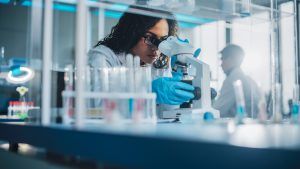How to become a laboratory technician: tips and courses to take
Among the professionals in scientific research and development, the laboratory technician plays a major operational role.
Charged with organizational responsibilities such as maintaining instruments and equipment, recording data, and conducting research, laboratory technicians may be employed in various areas of scientific research and development, such as the chemical, physical, biological, or pharmacological fields.

Who is the laboratory technician
The laboratory technician is a high-demand professional working within analytical, research and development , and quality control laboratories.
There are many operational tasks that the laboratory technician is expected to perform, from quantitative and qualitative analysis and laboratory testing to measuring and reporting of research work.
His role is to support the group of scientists working in the laboratory, which may consist of physicians, researchers, biologists, chemists, and engineers.
The work of the laboratory technician can therefore include:
- The use of instruments necessary to carry out analysis with microscopes, spectrometers, chromatographs, distillers, centrifuges, mixers, test tubes, flasks, and so on;
- The use of techniques and methodologies for documenting and recording data;
- maintenance of the equipment, which the laboratory technician must calibrate, clean, and sterilize in order to improve the efficiency and accuracy of the experiments conducted;
- Periodic stock control, which must not lack chemicals, reagents and disposable materials.
In what fields does the laboratory technician work
The laboratory technician can work in a variety of fields pertaining to scientific research: thus, he or she may be employed in chemical, biomedical, industrial or environmental testing laboratories.
In the industrial sector, it deals with quality control of raw materials, finished and semi-finished products in sectors such as textiles, petrochemicals, agribusiness and cosmetics. Or he may work in research and development projects on cutting-edge materials and treatments, as in the case of the automotive industry.
In the medical and health sector, he serves in biomedical laboratories of hospitals, health care facilities and clinics. As a biomedical technician, she is involved in tissue, blood and body fluid analysis.
In the environmental sector, he treats chemical and microbiological analyses of soil, air, and water so as to detect the presence of contaminants or hazardous substances.
The work of the laboratory technician
The work of the laboratory technician is very operational and requires skill and experience to be performed as accurately and efficiently as possible.
Working in analytical laboratories, it is not unusual to find yourself handling dangerous substances o potentially harmful if dispersed into the environment: therefore, it is important for such a professional to know how to keep the workplace aseptic, strictly follow safety protocols and use personal protective equipment such as gloves, gowns and goggles.
A laboratory technician ‘s duties may change depending on the field in which he or she is employed, but also on the experience and career he or she has undertaken. In general, a laboratory technician is responsible for:
- Perform qualitative and quantitative analysis on material samples;
- Collect data and produce reports;
- Prepare instruments and materials to conduct analysis and testing;
- Maintain, clean and calibrate laboratory instrumentation;
- Follow control and safety protocols;
- Manage the laboratory materials warehouse;
- Managing laboratory waste.
How to become a laboratory technician?
Since this is an operational job, to become a laboratory technician, it is necessary to undertake professional-technical training. It is then possible to specialize in the technician profession by pursuing a higher vocational training institute, such as the chemical expert.
Often, however, companies also require a bachelor’s degree , in a specific field: biology, biotechnology, chemical engineering, materials science, pharmaceutical chemistry and technology. Taking a bachelor’s degree program dedicated to the profession is particularly useful, because it allows for more technical skills, concerning analysis and testing methodologies, laboratory protocols, and the use of computer software to collect data and produce reports, to complement scientific knowledge.
A useful avenue to be able to launch one’s career as a laboratory technician and gain the necessary skills in a short time is to start with a position as a laboratory assistant, then advance through training and experience to the position of laboratory technical manager.
If you would like to learn more about the technical occupations that the job market requires, if you would like to learn about their duties and the study paths to take, check out our PHYDpedia!










0 Comments